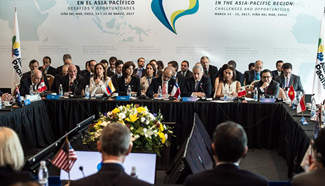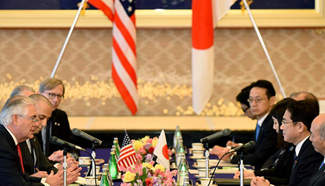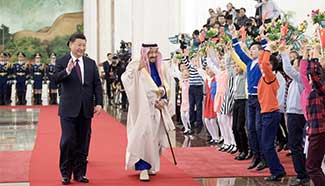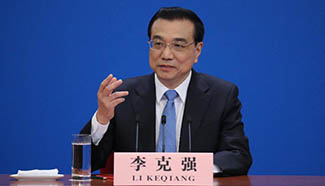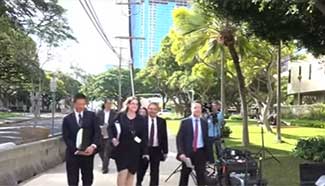BEIJING, March 16 (Xinhua) -- Since the U.S. slashed its interest rates to near-zero in 2009, emerging markets have born the brunt of Federal Reserve rate hikes, and this time will be no exception.
Emerging markets would be wise to act on the Fed's Wednesday announcement that it intends to increase rates for the third time since the financial crisis; should they fail to prepare, they might fall by the wayside as they navigate the bumpy road ahead.
The Fed's decision follows a string of encouraging signs in the U.S. economy coupled with high expectations for "Trump Economics," and the high performance of the U.S. dollar.
More hikes should be expected in 2017 if economic conditions continue to improve, thus, a stronger U.S. dollar is also highly predictable. China, alongside other emerging markets, should brace for the aftershocks.
Since the Fed began to increase rates in 2015, capital has flown out of emerging markets into the United States at an alarming rate. Emerging markets are in no position to raise rates as more hikes will feed the fires of market volatility.
Emerging markets should brace for heightened devaluation pressure. While weakening currencies would make their goods more competitive, this advantage is dwarfed by the difficulties of paying foreign currency debts in a devalued local currency.
Since the U.S. dollar is the world's premier reserve currency, the Fed should keep a close eye on its effect on emerging markets and enhance communication with these nation to limit any damage.
Emerging markets must act.
Countries that rely heavily on borrowing from the global capital market should address their vulnerability to abrupt capital flight.
China has its own monetary policy dilemma. Facing the widening rates gap with the United States, it has to remain cautious in raising rates, given the slowing growth and rising financial risks.
But China is in a stronger position to counter the shocks. It has ample foreign exchange reserves, and greater flexibility to keep a stable exchange rate. It's economic fundamentals is persistently improving.
Unlike in the past when the Fed's hints led to nothing, its latest decision came months ahead of what the market expected.
This suggests that faster growth is in the pipeline after nearly a decade of low rates. While the economy is improving, hangovers of the financial crisis remain unsolved: Wage growth is stagnant, the labor market unmotivated, and productivity is lethargic.
As Fed Chair Janet Yellen acknowledged, low rates are only working to some degree, and monetary policy is unable to generate technological advances or affect demographic factors that would boost real GDP growth over the long run.
Monetary stimulus has let the good times roll for years. When the Fed decides to take away the punch bowl, the United States needs to address its structural problems, emerging markets must buckle up and brace for landing.




